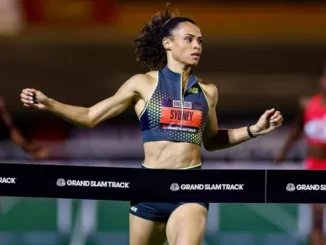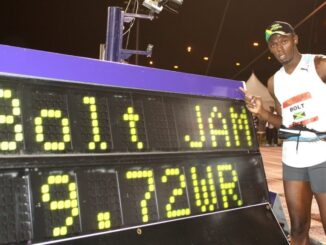
Justin Gatlin has joined Asafa Powell in wanting Jamaica to increase its track and field athletes’ welfare following Roje Stona and Rajindra Campbell’s decision to switch allegiances to Turkey
Former American sprint champion Justin Gatlin has lent his voice to growing concerns surrounding the welfare of Jamaican track and field athletes, following the recent decision by Jamaican throwers Roje Stona and Rajindra Campbell to switch their sporting allegiance to Turkey. Gatlin, a 2004 Olympic gold medalist and five-time World Champion, has joined Jamaican sprint legend Asafa Powell in calling for a more structured and supportive system for athletes representing the Caribbean nation.
Stona, a national discus champion, and Campbell, Jamaica’s shot put record holder, recently announced their decision to compete for Turkey. The move sent ripples through the Jamaican athletics community and reignited long-standing concerns about the lack of financial support, training resources, and development pathways for field event athletes in particular.
Asafa Powell, who has been vocal about the issue for years, expressed disappointment but not surprise. “These athletes have been doing well, breaking records, and showing potential, yet they struggle to receive consistent support from the system,” Powell said. “We’re losing talent, not because they lack patriotism, but because they need to survive and thrive.”
Gatlin echoed Powell’s sentiments, highlighting that national pride alone is not enough to sustain elite performance. “Athletes need more than just a flag to run for,” Gatlin said. “They need structure, backing, a clear pathway for development, and post-career opportunities. What’s happening in Jamaica with Stona and Campbell is a wake-up call for federations around the world.”
Jamaica has long been a global sprint powerhouse, producing legends like Usain Bolt, Shelly-Ann Fraser-Pryce, and Elaine Thompson-Herah. However, field events have not enjoyed the same level of attention, infrastructure, or investment. As a result, promising athletes often feel neglected or forced to seek better opportunities abroad, where countries like Turkey offer financial security, training facilities, and citizenship fast-tracks in exchange for international representation.
The Jamaica Athletics Administrative Association (JAAA) has come under increased scrutiny in recent weeks, with fans and former athletes urging officials to modernize the system. Critics argue that the federation is too sprint-centric and has failed to diversify its support across disciplines. While the JAAA has acknowledged the athletes’ decisions, it has yet to announce any concrete plans to address the underlying issues.
Both Powell and Gatlin believe that without significant reform, Jamaica risks losing more of its emerging talent. “Jamaican athletes are among the best in the world, but talent alone won’t keep them at home,” Gatlin said. “They need to see a future in the sport beyond medals — something sustainable.”
Their comments have reignited a national conversation about athlete support and have placed pressure on Jamaican sports authorities to act quickly. With the 2025 World Championships and the 2028 Olympics on the horizon, the loss of top-tier talent to other nations may have long-term implications for Jamaica’s competitive edge.
Unless meaningful changes are made soon, more athletes could follow the path of Stona and Campbell — not out of disloyalty, but in pursuit of the support they need to reach their full potential.



Be the first to comment